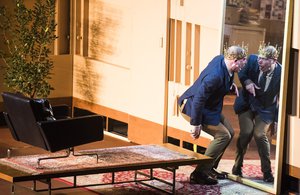Ivo van Hove’s 'Kings of War'
Performance of Kings of War
22 April 2016, Barbican Centre
Ivo van Hover in partnership with Dutch theatre company Toneelgroep Amsterdam
Review by Rebecca Watson, MA Shakespeare Studies

'Kings of War', Photo by Tristram Kenton
Just last year, the RSC staged what they called the 'Kings and Country' history cycle of Shakespeare’s history plays, covering the deposition of Richard II to the rise and success of Henry V. Now Ivo van Hove’s dazzling four-and-a-half hour Dutch production, Kings of War, covers the next generation of rulers: starting from Henry V’s glory in France and rapidly moving to the rise and coronation of Henry VII (in Shakespeare’s canon this is Henry V, Henry VI, parts I-III, and Richard III). As van Hove’s title suggests, it is a period of English history that is directly shaped by how English rulers handle instances of war, be they external (like Henry V in France) or internal (like Henry VI in his own court). And though these are strictly historical accounts of events, as evidenced by both the Shakespearean source text and the slideshow of the English succession played at the beginning of the production, van Hove stages the action in modern dress, suggesting these historical characters are not as distant as we may imagine, or hope.
Olivier-Award winning van Hove returns to the Barbican Centre with this marathon of a theatrical event after his critically-acclaimed 2009 Roman Tragedies, which covered Shakespeare’s Roman history plays in a succinct eight hours. Both productions, each done in partnership with Dutch theatre company Toneelgroep Amsterdam, utilised multi-media within the framework of the text. Henry V might make his famous speeches into the camera lens rather than out towards the crowd, and we might discover Henry VI hiding within the corners of the corridors backstage. An elaborate labyrinth of corridors is constructed offstage or backstage, and live cameras take the audience back with the actors as they retreat further into their minds or into madness. The constant video relay of information, be it onstage or off, suggests the distance modern rulers have from actual warfare or violence. All of their messages are relayed, and therefore performed, for the video’s audience, rather than the audience sitting in the Barbican’s seats.
Kings of War also integrates moments of prerecorded video material, allowing for more jarring material to intercut with the live performance. In one striking moment, Henry VI contemplates his inability to lead his people like the shepherd he is meant to be, while he walks offstage. In a smooth transition, prerecorded footage takes over from the live performance and we see Henry VI walk through the corridors only to find those sheep physically realised. He then loses himself within the crowd of animals, once again rendered ineffectual and powerless. These prerecorded moments, the modern Dutch translation of Shakespeare’s text (there were English surtitles), and the history of the plays could all alienate the Barbican audience further, but in fact seem to do the exact opposite: van Hove’s production brings Shakespeare’s plays into modernity and forces the audience to see themselves and the current political system within Shakespeare’s historic world.

